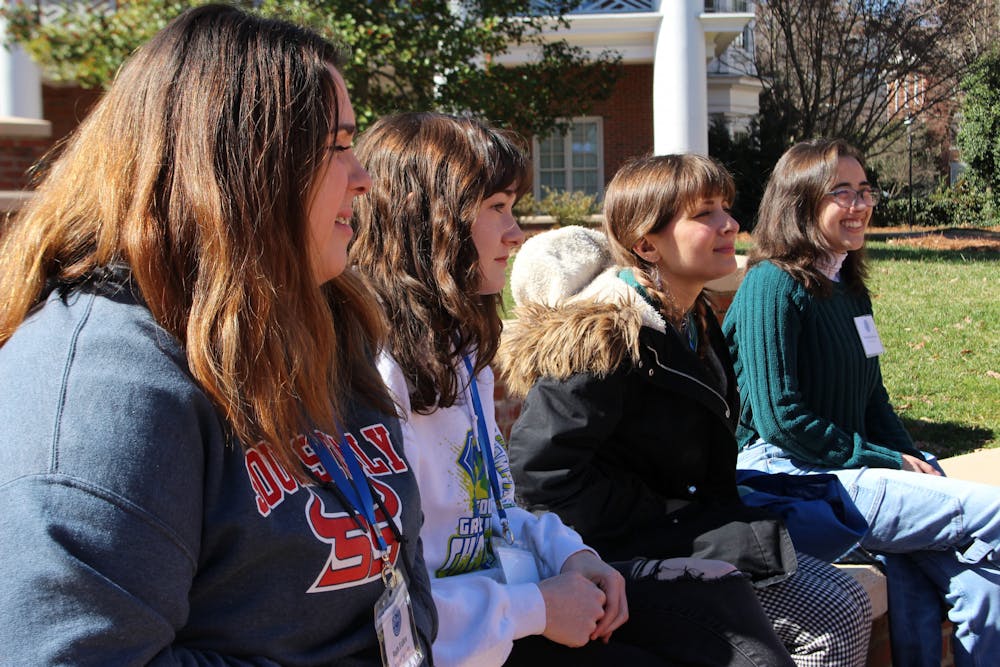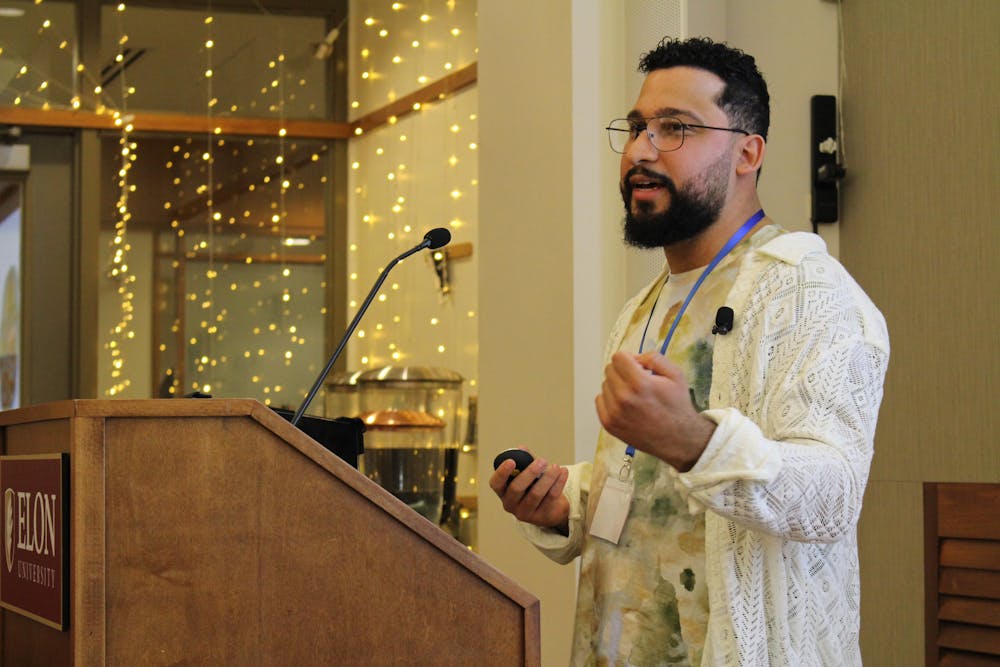Students from Elon University and visiting campuses left the three-day Ripple Conference after a weekend of interfaith discussion, speakers, and activities. The annual student-led Ripple Conference was sponsored by the Truitt Center for Religious and Spiritual Life and aimed to inspire interfaith students to create leaders within spiritual and religious work.
This year was the conference's eighth year and the first fully in-person conference since 2020.
Day one of the Ripple Conference began with an introduction from the Director of the Ripple Conference and Elon graduate student Ivy Breivogel. Breivogel prepared students for the coming weekend, introducing the theme of the Ripple Conference — Stretching the Limits of Religious Identities.
“We want to have conversations about our own experiences with religion, spirituality, faith, worldview or beliefs. We want to have conversations about how our religious traditions and spiritual practices influence and are influenced by our intersecting ideas,” Breivogel said.
To inspire conversation and introduce new perspectives, Anthony Cruz Pantojas, the humanist chaplain at Tufts University and Ripple’s keynote speaker, shared his experiences as a queer afro-Caribbean humanist.
“I think that as a humanist, I would say that I offer a positionality and understanding and a practice that's really looking at the expansiveness of the human condition, the human experience and really inviting into the conversation the multiplicity of who we are and who we are becoming,” Pantojas said.
Throughout the conference, students broke off into intimate student-led community groups for closer conversation. For many student leaders, including Elon junior Shannon Kutcher, it was their first time facilitating an interfaith conversation. Kutcher said she learned a lot about directing a conversation despite being intimidated by the task.
“It is all about vulnerability and being able to go into a space and set ground rules of treating each other with respect and confidentiality and assuming good from each other,” Kutcher said, “It led to such deep and enriching conversations.”

Conference participants create plastic yarn for Operation Bed Roll. The plastic yarn was turned into bed rolls for local individuals without homes. Operation Bed Roll was the last event of the conference, helping wrap up the weekend with a service project.
Kutcher was not the only one who took away lessons from her community group. From a student perspective, Roanoke College freshman Madeleine Rhyne got to know her group through in-depth conversation and storytelling. Rhyne says she enjoyed her community group and the connections it provided her.
“It gives you a chance to actually get to know the people you’re here with,” Rhyne said. “A good portion of the people in my group are Jewish and as a Christian, it's really interesting to me to hear their traditions and culture.”
Participants got to try a variety of foods from different cultures during the conference. Queens University junior Lucca Jorge Ferreira said he enjoyed trying new foods and had his first taste of Indian food during the conference.
“You experience diverse types of food with diverse types of people,” Ferreira said. “I think the Indian food is spicy, but it is cool because I have never had Indian food, so it is a good experience.”
On the second day of the conference, university librarian and archivist Libby Coyner joined students to lead a zine workshop. For many students, zines — mini works of self-published work and typically small circulated — were a new concept, including Jenna Lasky, a senior from Emory University.

Students attend a community group discussing the conference wide art project, zine creations. The community group decided to stay outdoors to converse further about personal stories and reflect on the Ripple Conference.
“I think it is a great way to bridge a lot of the topics we've been talking about,” Lasky said. “Especially the queer intersections with zine art and how art is a good form of expression of your spiritual identity.”
The second day consisted primarily of breakout groups for students to attend. Sessions included those about Kabbalah and Buddhism, which Elon sophomore Caden Samuel attended. Samuel said it was interesting to see a rabbi and Buddhist monk talk about their beliefs and experiences on similar topics.
Dinner was served while the Winterfaith panel spoke about reproductive justice across faith traditions. Winterfaith events consist of opportunities for engagement within different expressions of religion and spirituality specifically in the month of winter. This year, Winterfaith paired with the Ripple Conference to host a panel discussion.
Three panelists included the Rev. Brandee Jasmine Mimitzraiem, director of Institutional Engagement and Public Theology for the Religious Coalition for Reproductive Choice; Keeli Gailes, physical therapist and founder of nonprofit Health for People; and Hillary Zaken, Elon interim assistant dean of Multifaith Engagement, . The panelists spoke on the variety of ways reproductive health applied within spirituality and faith.
Throughout the panel, students took notes while the panelists talked about some key topics, including the intersection of spirituality and reproductive rights, underrepresented groups' treatment in healthcare and information on how students can get involved in improving reproductive healthcare for all.
Elon junior Jillian Shor moderated the panel. Shor said the topic is very personal to herself because of her own intersections as a woman in healthcare involved in interfaith.
“The pressure was definitely on,” Shor said. “I wanted to make sure I did the best I could to get their messages across and lead them to responses that could help everyone listening.”
Day two ended with Sacred Sounds, a space where students were invited to perform in front of Ripple attendees. Students performed original works, blue-grass covers, spiritual music and original poems.
Day three of the conference was centered around the service project students could participate in. The Ripple Conference paired up with Elon Sustainability to collect plastic bags that participants could recycle into bedrolls for homeless individuals.
Operation Bed Roll was put together by Elon sophomore Jasmine Walker, who said she was inspired to educate people and help those with homelessness when she realized many Elon students were not aware of poverty and homelessness levels in Alamance County.
“This is something I've always been passionate about, especially coming from living in poverty as a child here,” Walker said. “With Operation Bed Roll, we are able to get an insight on how people live, not just in the campus, but in the community.”
In 2021, 15.9% of Alamance County residents experienced “severe housing problems,” according to Data USA.
Operation Bed Roll was the last event of the Ripple Conference, leaving Breivogel to reflect on the weekend spent interacting with peers and exploring interfaith.
“I am so impressed and happy and proud about the Ripple Conference this weekend,” Breivogel said. “I definitely saw a lot of engagement, heard a lot of people and had so much fun with the conference. People are excited to take this interfaith and interpersonal approach to things outside of this conference.”


